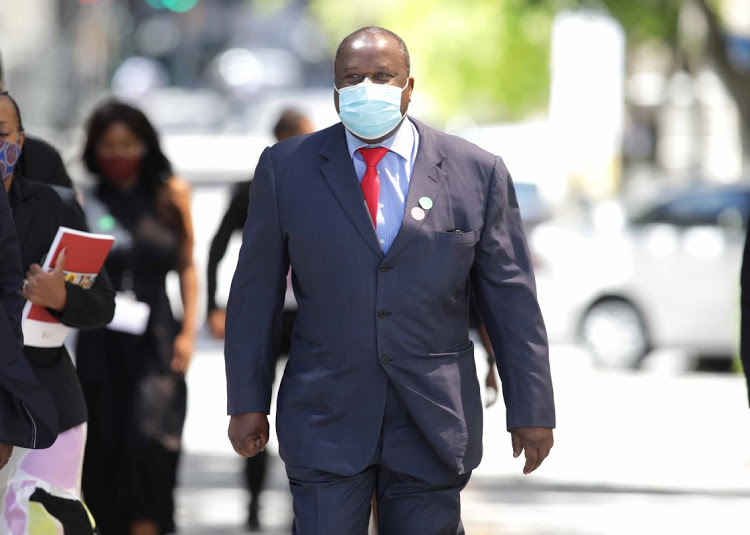This was the address by finance minister Tito Mboweni, during his Budget Speech in Parliament earlier today.
“As an immediate priority, the government will roll out a mass Covid-19 vaccination campaign to the public free of charge. This will save many lives and support a full reopening of the economy. Over time as global lockdowns are phased out in response to vaccination efforts, SA will benefit from the resumption of international goods trade and a resurgence in tourism, “said the minister.
On Tuesday, Stats SA figures showed unemployment rate increasing to 30.8%, with the number of unemployed people increasing from 4.3 million to 6.5 million.
No tax increase for PAYE as Treasury opts to scrap proposed tax increases of R40bn but corporate taxes will instead be reduced, to try and get companies to invest in the country.
Sin taxes: Beer increase by 14c, Wine 86c, Spirit R5.50 and Cigarette by R1.39
Fuel levy increases in April, and social grant increase by R30.
The state will spend R2-trillion each financial year for the next three years, the bulk of which goes towards social spending.
National departments receive R763.3bn of total allocations this year; provinces will share R639.5bn, while municipalities are allocated R138.5bn.
The state needs to borrow R500bn this year to meet to make up for the revenue shortfall, but its borrowing requirements will decrease to R377bn by 2023/24.
Learning and culture receives the lion’s share this year at R402.9bn. Social development — which encompasses the payment of various grants — is allocated R335.3bn, and health spending increases to R248.8bn.
An amount of R18bn has been allocated to the Infrastructure Fund over the next three years to support the state’s huge infrastructure investment initiatives, expected to drive economic growth.
While tax revenue is still R213bn below target, SARS was able to collect R99bn more than anticipated as the economy gradually reopened. This increase in revenue spells good news for workers, with the Treasury opting to scrap proposed tax increases of R40bn.
R11bn has been prioritised for the Presidential Youth Initiative.
The Treasury warned in its Budget Review document that urgent steps were required to avoid the country entering into a debt spiral and possibly defaulting on repayments.
Government debt will stabilise at 88.9% of GDP by 2025/26 before declining and a surplus is recorded.
The Independent Power Producer Office is expected to announce successful bids for an extra 2,000MW of emergency power in the next few weeks. These projects will start generating power from July 2022.
The government is also planning a new procurement process for 11,000MW from independent power producers, while regulations allowing municipalities to purchase directly from IPPs are now in place.
Other urgent reforms include speeding up digital migration to allow for the release of additional spectrum, speeding up the visa electronic system, reviewing regulations and processes that make it difficult to import scarce skills, and finalising a White Paper on national rail policy which could finally legislate in favour of private rail concessions.
The minister also made a clarion call to the State Capture Commission Inquiry to complete its job because “we no longer have the money to bankroll it”. This follows the extension by another three-months by the Justice Department.
“R63m was allocated and this perpetual continuation must come to an end, because I’m no longer going to sign any tranche of money to the Commission” he said.
Mboweni said government was phasing out performance bonuses and considering whether to “amend or abolish some allowances or benefits”.
His tough stance is consistent with the position adopted by President Cyril Ramaphosa’s administration when it offered government workers no increases last year, citing affordability.
Despite labour unions challenging that decision in court Mboweni has stuck to his guns.
He told MPs that over the next three years he was “proposing a significant moderation in spending in the consolidated wage bill, which grows by an average 1.2% over the medium term”.
The move is likely to heighten hostility between Ramaphosa’s government and labour organisations such as Cosatu and the Public Servants Association.
The public sector wage bill stood at R550bn in 2017, shooting up to R623bn by 2019, the period characterised by above-inflation increases during Jacob Zuma’s presidency.
The government will negotiate on the basis of fairness, equity and affordability, said Mboweni. A pact that exceeds budgeted amounts would be a risk for the fiscal framework.
But Mboweni said the public sector wage bill would peak at just under R660bn in 2024 as he pushed for modest increases and other measures to trim the salary bill.
Image (Is he tilting left or right? Minister of finance Tito Mboweni making his way to present his 2020/21 Budget Speech today).

